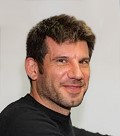Abstract
The application of computational approaches in the humanities has been scarce but for a few areas and specific applications such as NLP and textual analysis, geospatial analyses, and quantitative historical approaches. This is related to multiple causes including current academic field divisions and traditions, economic interests and, perhaps more interestingly, the nature of humanities' data types.
This presentation will briefly discuss these factors, investigate the nature of data within the humanities, and analyse their potential to contribute to major research topics beyond the humanities. A series of multidisciplinary case studies will illustrate how the combination of HPC, ML, and other computational approaches has the potential to unlock complex and unstructured humanities data and, by doing so, contribute to the understanding of human nature and improve humanity's future.
 Short Bio
Short Bio
